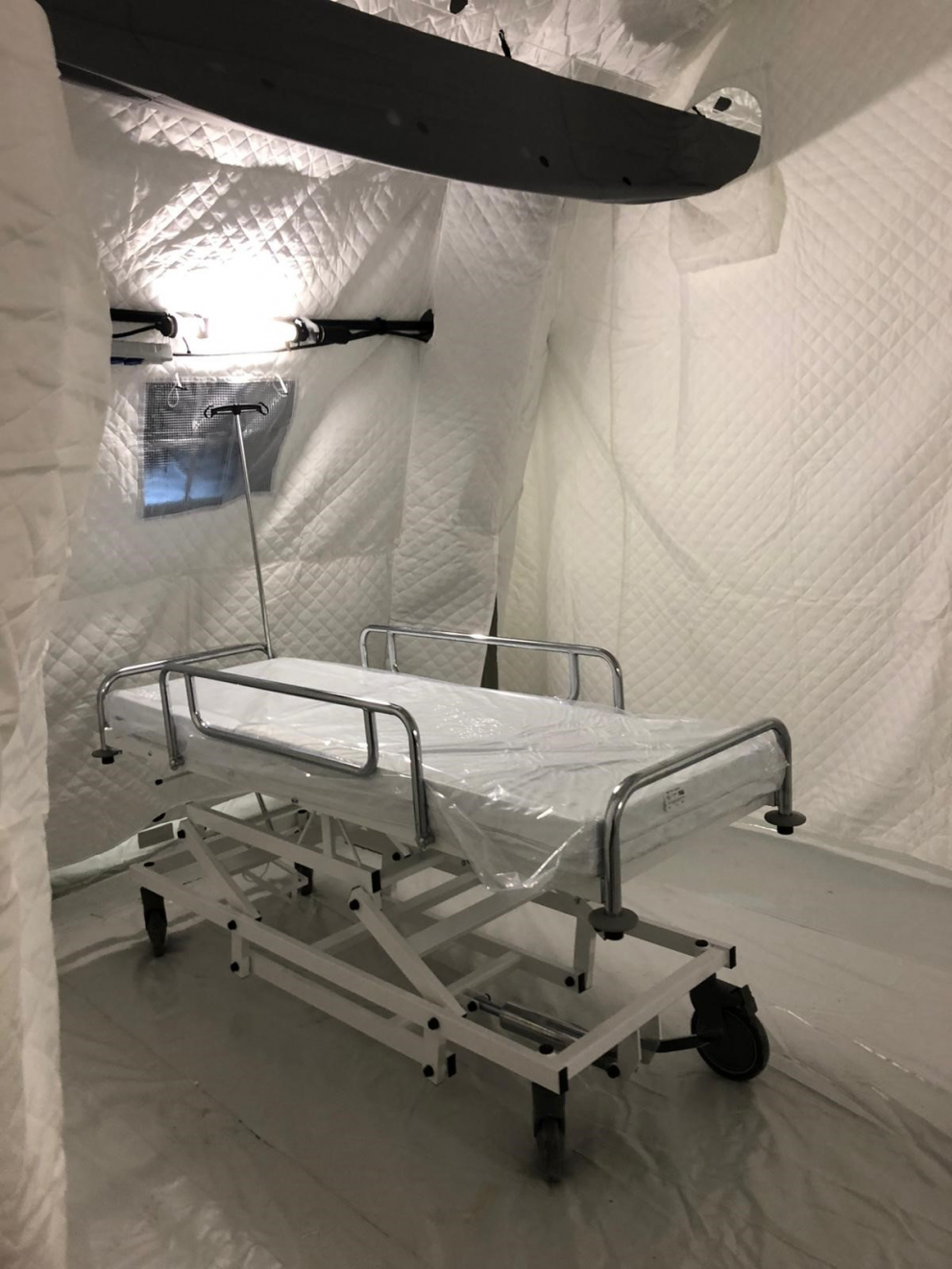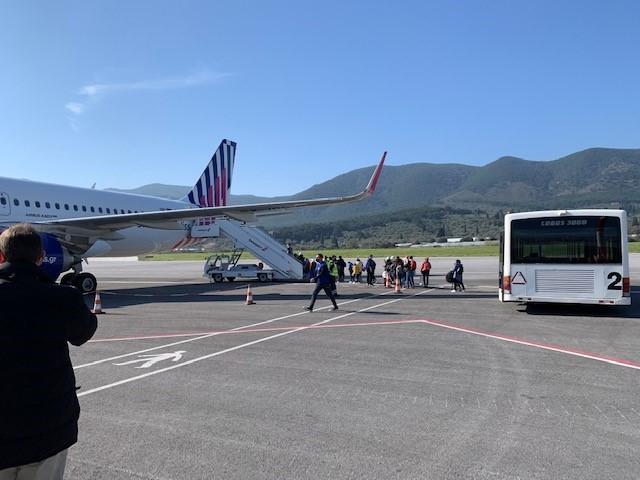Emergency support actions after the Moria fire
After the fire in the Moria camp in September 2020, 12,362 people were left without shelter. The Commission, together with several partners, provided immediate support to assist the Greek authorities in providing shelter as quickly as possible.
The Commission immediately provided:
- the assistance in rapid transfer and accommodation of 406 unaccompanied children and teenagers from Lesvos to the mainland of Greece
- exceptional financial assistance to support people affected by the fires
- funding the use of two ferryboats to transport beneficiaries of international protection to the mainland
EU’s Civil Protection Mechanism

Through EU's Civil Protection Mechanism, Greece received over 170,000 items supplied by Austria, Cyprus, Germany, Denmark, Finland, France, Hungary, Latvia, Poland, Romania, Slovakia, Slovenia, Sweden and the UK, and further bilateral help was offered by Belgium, Norway and Switzerland.
Several EU countries donated tents which were transported to Lesvos:
- 100 tents from France
- 100 tents from Austria
- 100 tents from Sweden
- 10 winter tents from Denmark

Other items, such as blankets, sleeping bags and hygiene kits, donated by several Member States, have been distributed to the residents. Also, some 40 sanitary containers and portable sinks, and 295 waste stations were sent from Germany for the new temporary facility.
Member States continue their support to improve the living conditions in the temporary facility on Lesvos and the reception centres on other Aegean islands.
- Switzerland site planning experts supported the Greek authorities in setting up an emergency shelter on Lesvos. Swiss experts, together with the German Red Cross, set up the initial structure for water and sanitation facilities (tanks, tap stations) and organised water trucking.
- Norway and Germany sent emergency medical teams.
- The Netherlands provides its expertise on shelters for unaccompanied children and teenagers and also donated a new modular field hospital to provide medical treatment on Lesvos.
- Austria supported a project to strengthen the operational capacity of the health structures serving residents of the temporary facility.
- Germany has supported capacity building and the implementation of counselling structures for voluntary returns.
The Task Force engages with Member States to ensure this continues in a coordinated approach.
An end to island overcrowding
As part of the agreement establishing the Task Force, the Commission and the Greek authorities have committed to making sure the reception centres on the islands are not overcrowded. This is key for the dignified reception of residents, but also to relieve local communities.
Overcrowding has now been substantially reduced:
- in 2020, over 31,800 transfers from different islands to the mainland have taken place
- since the start of 2021, a further 9,647 transfers of persons have been performed by mid-July
Protecting unaccompanied children and vulnerable people

In coordination with the Commission, the Greek authorities implement a relocation scheme of unaccompanied children and teenagers, other vulnerable refugees and families from Greece to participating Member States. The scheme is also run with the support of:
- European Union Agency for Asylum (EUAA)
- International Organization for Migration (IOM)
- UN Refugee Agency (UNCHR)
- financial support of the Commission
The scheme started in March 2020, but following the destruction of the Moria camp, Member States and associated countries pledged to relocate more unaccompanied children and teenagers, beneficiaries of international protection and vulnerable asylum seekers from Lesvos and Greece.
The Commission doubled its financial support to match the increased number of pledges, bringing the overall contribution to about €30 million and extending the project until the end of May 2021.
Relocations in numbers
Until October 2022, more than 5 000 people were relocated to:
- 13 EU countries: Belgium, Bulgaria, France, Croatia, Finland, Germany, Ireland, Portugal, Luxembourg, Lithuania, Slovenia, Netherlands and Italy
- 3 associated countries Norway, Switzerland and Iceland
The implementation of the remainder of the pledged relocations is ongoing.
Read more about the relocation process and how the European Commission facilitates relocations on the dedicate webpage.
Support to local communities
The local population on the Aegean islands are exposed to an enduring reception crisis in the Eastern Mediterranean and are still suffering from the economic and social consequences. That is why a coordinated approach that ends overcrowding and ensures a well managed migration is an important expression of solidarity with the local communities.
The Commission listens to and understands the concerns and problems of the people living on the islands, as stated by Commissioner Ylva Johannsson during her visit to Lesvos and Samos, and supports the Greek authorities to improve the situation both for migrants and local communities.
Through the funds of the North Aegean Operational Programme, the European Commission is since long supporting the economic and social fabric of the region, boosting economic development and creating job opportunities in the islands of the North Aegean.
Assisted Voluntary Returns
Assisted Voluntary Return and Reintegration is an indispensable part of a comprehensive approach to migration management. It aims to ensure an orderly and dignified return and reintegration of migrants who are unable or unwilling to remain in host or transit countries and wish to return voluntarily to their countries of origin.
Funded by the EU and Greece, IOM accompanied 2,565 migrants to return to their home countries in 2020, where each family received from €300 € to €2,000 of financial support depending on the country of origin and family size.
Partnering with international organisations and NGOs on the ground

Projects financed by the European Commission are brought to reality with the help of implementing partners on the ground:
UN Refugee Agency (UNCHR)
UNICEF
International Organization for Migration (IOM)
International Federation of Red Cross
They are key partners on the ground implementing the EU-funded projects for improving the temporary facility on Lesvos, as well as other projects concerning unaccompanied children, protection services, education, relocation and voluntary return.
They further collaborate with non-governmental organisations who are present on a day-to-day basis and provide support, from providing non-formal education to improving hygiene and sanitation conditions.

